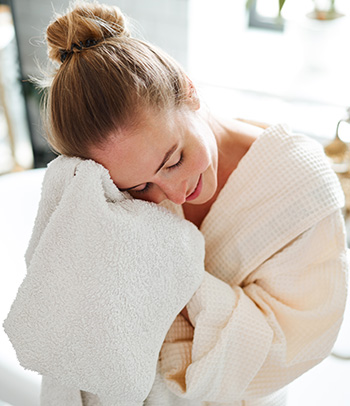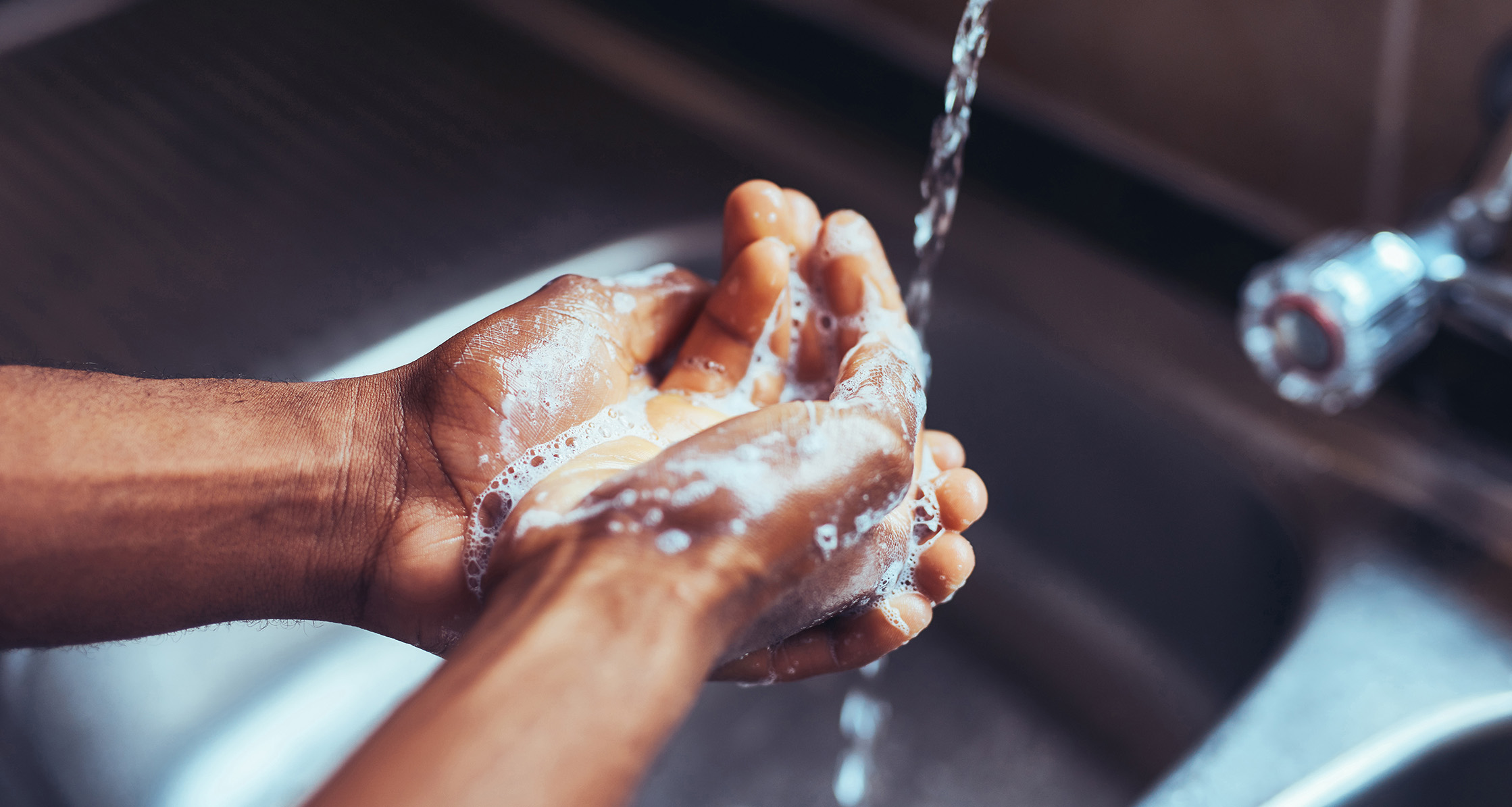Personal hygiene is a great place to start to keep your body healthy and safe from infection and illness.
Every day, we come into contact with hundreds of germs, bacteria and viruses. They come from surfaces like countertops, toilets and door handles. They come from sneezes and coughs. They come from shaking hands and taking out the trash.
These germs can linger on your hands and body, but good personal hygiene can protect you from illness and infection.
Your personal hygiene relates to how you care for yourself, including bathing, washing your hands, brushing your teeth and more.
Learn more about the importance of personal hygiene, tips for maintaining proper hygiene and how it can relate to other health conditions.
How Does Hygiene Affect My Health?
 When you establish good hygiene habits, like washing your hands regularly and cleaning your hair and body, you reduce your chances of getting sick from germs and viruses. You also reduce your chances of getting an infection such as athlete’s foot or pinworms. Practicing good hygiene habits regularly can also make you feel good about yourself and boost your overall self-esteem.
When you establish good hygiene habits, like washing your hands regularly and cleaning your hair and body, you reduce your chances of getting sick from germs and viruses. You also reduce your chances of getting an infection such as athlete’s foot or pinworms. Practicing good hygiene habits regularly can also make you feel good about yourself and boost your overall self-esteem.
Poor hygiene, on the other hand, can lead to minor issues such as body odor or greasy feeling skin or hair. It can also lead to infection, illness and other types of health issues. For example, not washing your hands before you touch your face can leave you susceptible to respiratory illnesses like the flu, as well as infections like pink eye. According to the Centers for Disease Control and Prevention (CDC), there are several hygiene-related conditions such as:
- Athlete’s foot
- Head and body lice
- Chronic diarrhea
- Tooth decay and plaque buildup
- Rashes
- Pinworms
- Scabies
- Swimmer’s ear
- Ringworm
Tips for Establishing Good Hygiene Habits
If you or someone you love is struggling to maintain good hygiene habits, here are some suggestions that may help:
 Learn about the different aspects of personal hygiene. Personal hygiene relates to many different aspects of your health, including:
Learn about the different aspects of personal hygiene. Personal hygiene relates to many different aspects of your health, including:
- Dental hygiene – To prevent gum disease, cavities, bad breath and other dental issues, experts say you should floss daily and brush your teeth twice a day for two minutes. Check out Show Off That Smile: Why Your Dental Health Matters for more information.
- Facial hygiene – According to the CDC, we touch our faces 23 times an hour. That gives germs, viruses and bacteria a lot of chances to enter your body through your eyes, nose and mouth. Respiratory illnesses like colds and flu, as well as infections like pink eye, can be prevented by keeping your face clean.
- Body hygiene – We have millions of sweat glands on our body that can accumulate sweat, oil and bacteria. This can lead to body odor and skin irritation. Rinse your body regularly with soap and water to eliminate dead skin cells, bacteria and oil from your skin.
- Hand hygiene – Washing your hands regularly is one of the best ways to protect yourself from germs and illnesses such as the flu. The CDC recommends washing your hands with soap and water for at least 20 seconds before and after handling food, after using the bathroom, after coughing or sneezing, and more. For more details, check out Hand-washing 101: Why It Matters.
- Nail hygiene – Your fingernails can trap dirt and germs underneath them, so the CDC recommends trimming them and washing underneath them to reduce your risk for infection.
- Foot hygiene – Keeping your feet clean and dry can reduce your chances of picking up an infection such as athlete’s foot or a fungal nail infection. Wash your feet, keep your toenails cut and clean, and change your socks regularly to ensure your feet stay healthy.
- Hair hygiene – Dead skin, dirt, product residue and oil can build up on your scalp and increase your risk for infection. Select a shampoo and conditioner that work for your hair type, and wash your hair and scalp regularly. This can help you avoid things like ringworm or head lice.
- Establish a routine. If you make personal hygiene a part of your daily routine, you’re more likely to stick to it. For example, try doing things at the same time each day. Or establish a set day for laundry so you always have something clean to put on.
- Set reminders. If you need some extra help, especially if you’re starting a new habit, set a reminder on your phone. You can use an alarm or the reminder feature for mornings when you need to wash your hair for example. Set a timer for two minutes to brush your teeth.
- Use visual signs around the house for yourself, your children or your loved ones. If you, your kids or an elderly loved one need a visual reminder, place signs in different places around your house. Try “Did you wash your hands?” next to the light switch in the bathroom or a little checklist before bed that includes flossing, brushing and whatever else you want to include.
- Teach your children good hygiene habits. Kids need help learning this stuff. Teach them about hygiene and why it matters, model good behaviors, help them establish good habits, and give them encouragement or incentives to keep going.
- Encourage, don’t shame. Personal hygiene can be a very personal topic. Shaming someone struggling with hygiene may make them feel more isolated or depressed. Encourage them, teach them why it’s important and help along the way.
- Make it easy. Keep a face wash in the shower, keep hand soaps at each sink, and keep sanitizer or wipes in the car for times when you can’t wash your hands properly.
- Keep up with your health care visits. Your primary care provider can help address any hygiene-related issues or questions you may have, and give you tips on how to address conditions you may develop.
- Ask for help. You might feel ashamed or uncomfortable admitting to it, but if you’re finding it difficult to take care of yourself, ask for help. Personal hygiene can be linked to diseases like Alzheimer’s and dementia or a mental health condition such as post-traumatic stress disorder (PTSD) or depression. For others, drug and alcohol misuse can play a role in poor hygiene habits. Any of these health conditions can make it difficult to cope with everyday tasks such as brushing your teeth or getting in the shower. The Department of Veterans Affairs (VA) has a wide range of mental health resources designed to help.
Resources
- The Department of Health and Human Services designed a handout entitled Women, Hygiene & Infections, full of personal hygiene tips specifically for women.
- VA offers several benefits and services that can help you keep up with your personal care. Contact your local VA facility to learn more about services such as dental care, eye care, primary care services and more.
Personal hygiene is a great place to start to keep your body healthy and safe from infection and illness. Get started on healthy hygiene habits today!







